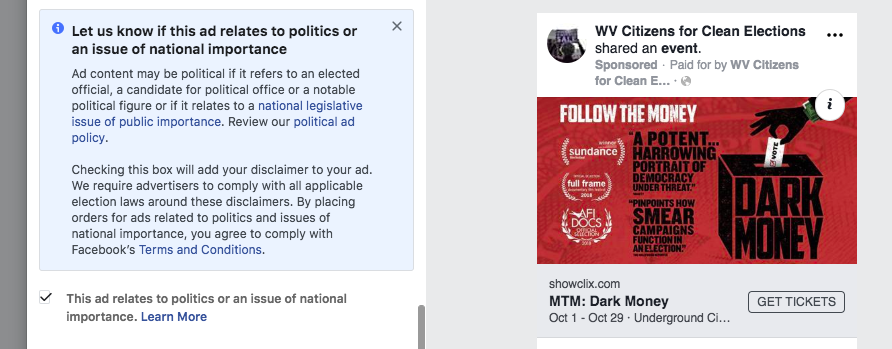
Facebook and Twitter: What you need to know as a nonprofit in election season
Paying for Issue Advocacy Advertisements? You Might Have to Register.
This information is republished from the Bolder Advocacy Digest courtesy of the Alliance for Justice
As of September 7, 2018, we are within 60 days of the general election in November. For nonprofits, including 501(c)(3)s, this means you should be aware of the rules surrounding electioneering communications.
Under federal law, electioneering communications are targeted broadcast ads (TV, radio, cable, and satellite) aired within 30 days of a primary or 60 days of a general election that refer to a clearly identified federal candidate. This applies even to communications unrelated to the upcoming election. For example, a paid radio ad run at the end of September in the state of Indiana with the language “Tell Senator Donnelly to vote no on Brett Kavanaugh” would be considered an electioneering communication because Senator Donnelly is running for reelection.
If a nonprofit spends $10,000 to produce and air electioneering communications, the group must report those expenditures on FEC Form 9 (“24-Hour Notice of Disbursements/Obligations for Electioneering Communications”) within 24 hours of the advertisement airing. The organization must file additional reports each additional time that the organization spends another $10,000 in electioneering communications.
What you need to know about Facebook and Twitter’s new policies
This information is republished from the Bolder Advocacy Digest courtesy of the Alliance for Justice
As of 8/30/18, Twitter announced that it updated its policy on issue advocacy. The new policy targets issue advocacy ads that advocate on legislative issues of national importance. To date, these legislative issues include abortion, civil rights, climate change, guns, healthcare, immigration, national security, social security, taxes, and trade. Twitter expects this list to evolve over time.
In order to create a paid ad that discusses one of the subjects, the ad’s sponsor must go through Twitter’s certification process and meet Twitter’s requirements. These include the requirements listed below (in the earlier blog post) and a “paid for” disclaimer. Unlike Facebook, Twitter does have an exemption for news publishers.
Both political and issue ads will be included in Twitter’s Ads Transparency Center. This will provide details on billing information, ad spend, and targeting information.
This new policy will go into effect in the United States on September 30, 2018.
Register now with Facebook to save you stress later
Think your ads are 501(c)(3) safe so you don’t need to worry? Think again. What Facebook counts as an ad is VERY broad. Practically every issue we could conceivably make an ad about probably requires political registration.
And the process is very easy and doesn’t cost you anything or change anything about your Facebook experience (there are two small changes we cover below), but requires a couple days of waiting for a snailmail letter. That’s why I recommend you take the two minutes to do it now, rather than be frustrated later when you want to promote some Facebook content.
So here is what you need to do:
- Go here. You will need a government ID scan, the last 4 digits of your SSN, and a mailing address.
- Wait for a code mailed to your address from Facebook. This can take 1-2 weeks. (It took me about 5 days)
- Enter the code in Facebook by following the instructions mailed to you.
Remember that you are registering to run ads as yourself, and will be able to run ads in the future on any pages you are an admin of. That means that if you need to run an ad in the meantime (or forget to do this process now and need to run an ad later), several of the ReThink staff are verified and can help you out.
There are two small changes that you should be aware of when you check that box for an “ad that relates to politics”:
- Ads that are labeled as political will include a “paid for by…” disclaimer. You can write your organization or coalition name here.
- Facebook will maintain an archive of ads published after May 7, 2018 which have been deemed to “contain political content.” These ads will be stored for up to 7 years. The public can access these.
Please let someone at ReThink know if you have any questions and don’t hesitate to reach out if you would like help writing, designing, planning, or targeting your social media ads.


